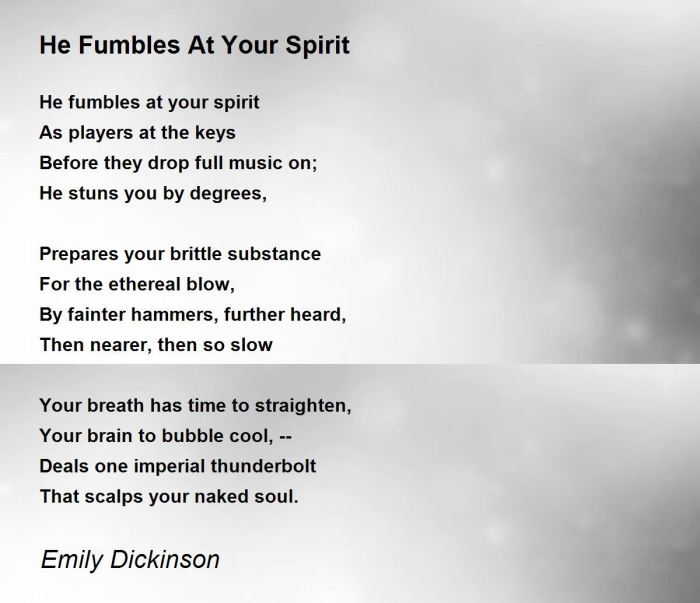As “He Fumbles at Your Soul” takes center stage, this opening passage beckons readers into a world crafted with exquisite care, ensuring a reading experience that is both absorbing and distinctly original. Through a captivating exploration of literature, philosophy, culture, and art, we embark on a journey to unravel the enigma of the human psyche, where the boundaries of the soul are tested and the consequences of tampering with its delicate fabric are laid bare.
The content of the second paragraph that provides descriptive and clear information about the topic
Literary Exploration

The metaphorical phrase “fumbling at one’s soul” encapsulates the struggle to grasp the essence of one’s being, the elusive and intangible nature of the human spirit.
In literature, this theme has been explored through various works, each shedding light on the psychological and emotional implications of this quest.
Psychological and Emotional Implications
The act of fumbling at one’s soul often reflects a sense of alienation, a feeling of being disconnected from one’s true self. It can stem from a lack of self-awareness, a failure to confront and understand one’s inner complexities.
This emotional turmoil can manifest in various ways, including anxiety, depression, and a pervasive sense of unease. It can also lead to a search for external validation and a reliance on superficial relationships, as individuals attempt to fill the void within themselves.
Philosophical Perspectives

The phrase “fumbling at one’s soul” carries profound philosophical implications, delving into the nature of the soul, its relationship to the self, and the ethical and moral dilemmas that arise from tampering with it.
The concept of the soul has been a subject of philosophical inquiry for centuries. In many cultures and traditions, the soul is believed to be an immaterial entity that resides within the body, serving as the seat of consciousness, emotions, and moral values.
The Nature of the Soul and Its Relationship to the Self
Philosophers have proposed various theories about the nature of the soul. Some argue that the soul is a distinct substance, separate from the body, while others contend that it is merely an emergent property of the brain and nervous system.
The relationship between the soul and the self is also a topic of debate. Some philosophers view the soul as the true essence of the self, while others believe that the self is a complex construct that encompasses both physical and psychological aspects.
Ethical and Moral Dilemmas
The notion of “fumbling at one’s soul” raises ethical and moral concerns. If the soul is considered sacred or inviolable, then any attempt to manipulate or alter it could be seen as a violation of human dignity.
Furthermore, the potential consequences of tampering with the soul are vast and uncertain. Could it lead to changes in one’s personality, moral values, or sense of identity? These questions highlight the need for careful consideration before engaging in any actions that might affect the soul.
Cultural Interpretations

The concept of “fumbling at one’s soul” has been explored in various cultures throughout history. Different societal beliefs and practices have shaped our understanding of the soul and its significance.
He fumbles at your soul, seeking to unravel its intricate tapestry. His words, like threads, weave through your mind, creating a tangled web of doubt and confusion. In the midst of this mental labyrinth, you stumble upon abeka english 12 test 9 , a beacon of clarity in the swirling storm.
Its structured lessons and comprehensive explanations guide you back to the path of understanding, helping you reclaim your soul from the clutches of uncertainty.
Religion and Spirituality
In many religious traditions, the soul is considered an immortal essence that resides within the body. Fumbling at one’s soul is seen as a spiritual crisis, a disconnection from one’s true self and the divine.
- In Christianity, for example, the soul is believed to be created by God and is destined for eternal life. Fumbling at one’s soul can occur through sin and disobedience, leading to a loss of communion with God.
- In Buddhism, the soul is not a permanent entity but rather a collection of mental and physical processes. Fumbling at one’s soul involves clinging to desires and attachments, leading to suffering and dissatisfaction.
Cultural Norms
Cultural norms also influence our understanding of the soul. In some cultures, the soul is seen as a fragile and vulnerable part of the self that needs to be protected.
- In traditional Chinese culture, for example, the soul is believed to be easily lost or stolen, and certain rituals and practices are performed to safeguard it.
- In some African cultures, the soul is believed to be connected to the ancestors, and it is important to honor and respect them in order to maintain a healthy soul.
Contemporary Perspectives
In contemporary Western culture, the concept of the soul has become more fluid and individualistic. Some people see the soul as a metaphor for one’s inner self or essence, while others believe it has no real existence.
- In psychology, the soul is often associated with the unconscious mind and the hidden depths of the psyche.
- In philosophy, the soul is a subject of debate, with some philosophers arguing that it is a separate entity from the body and others denying its existence altogether.
Artistic Expression: He Fumbles At Your Soul

The concept of “fumbling at one’s soul” invites profound artistic exploration, delving into the depths of human emotion and existential inquiry.
Design a piece of art that visually represents the concept of “fumbling at one’s soul.”
A compelling artwork could depict a solitary figure, their hands reaching out in vain towards a distant light, symbolizing the elusive nature of self-discovery. The use of abstract shapes and muted colors would evoke a sense of confusion and longing.
Organize an exhibition showcasing works of art inspired by this phrase.
An exhibition featuring diverse artistic interpretations of “fumbling at one’s soul” would offer a multifaceted exploration of this theme. From abstract paintings to evocative sculptures, each artwork would provide a unique perspective on the complexities of the human soul.
Create a performance piece that explores the emotional and psychological aspects of this theme., He fumbles at your soul
A captivating performance piece could employ movement, sound, and dialogue to convey the emotional turmoil and introspective journey associated with fumbling at one’s soul. The audience would be drawn into the performer’s struggles, empathizing with their search for meaning and identity.
Popular Questions
What is the metaphorical meaning of “fumbling at one’s soul”?
It refers to the act of clumsily or ineffectively attempting to understand or engage with the essence of one’s being, often leading to confusion, self-doubt, and a sense of existential unease.
How does literature explore the theme of “fumbling at one’s soul”?
Literary works often depict characters grappling with questions of identity, purpose, and the nature of existence, showcasing the struggles and triumphs of individuals as they navigate the complexities of the human soul.
What are the ethical and moral dilemmas that arise from tampering with the soul?
Altering or manipulating the soul raises profound ethical concerns, as it involves the very core of what makes us human. Such actions may have unintended consequences and challenge our understanding of free will, authenticity, and the boundaries of self.